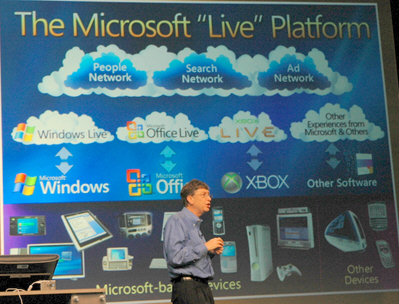Drinking too much Google Kool-Aid

On the Steve Gillmor Daily show podcast (here and here), Steve and I debate about an upcoming battle between Microsoft and Google for dominance in the next wave of computing. Of course, the notion of Google laying siege to Microsoft's cash cow is over-hyped, over-analyzed and presumes that all kinds of things will neatly fall into place. Steve believes that Google's piecing together of an ad-supported Office-like suite will force Microsoft to bundle whatever Office Live is becoming with Windows Vista when it ships. The land-locked Office 2007 bundle is dead, he says.
My take is that Steve, a dedicated Gmail/Gtalk user, drinks too much Google Kool-Aid. Microsoft will have a slick ad-supported Office in its bag, but the GMail, Writely, Blogger combo isn't unassailable or competitive anytime soon with Office 2007 for the installed base of Office business users. Even if Google adds the basic spreadsheet, presentation capabilities and more collaborative features--no rocket science required--what would make it so compelling that users would flock to it?
Clearly Microsoft is responding to Google's challenge (here's a list of the Windows Live services in the works) as it did to Netscape's a decade ago. It's not about rich client desktop applications versus rich client networked applications. For Microsoft, given its heritage, it's about having the best of both worlds, integrating online and offline, e.g., Windows Live Desktop. There's no mystery about what direction to head (see the photo below), it's all about speed and execution. And, remember, Microsoft is the company that came up with Live Clipboard.

Online is emerging as the dominant architecture for everyday consumer applications, but business applications will require more and more reliable bandwidth and grids, software infrastructure that meets corporate and regulatory requirements and major mindset changes. It won't be next year, or the next. Microsoft will have its online Office Lite, giving users a choice and promoting the "seamless integration" theme. Then it becomes an issue of whether customers want to say in the Windows fold or go with more open and composable, and potentially lower cost, alternatives.
No doubt, Microsoft's historic business model is stressed as open source, ad-supported and less costly alternatives to Office, Exchange, Windows, etc. gain traction, but Microsoft eventually figures out how to adapt. Google dominates search and is soaking up the ad revenue, but that doesn't mean it gets a free pass for other categories or that a drag effect uniformly applies.
What we end up with is a period of great hyperactivity and innovation. None of the companies are standing still, and plenty of start-ups creating innovative applications are praying that AOL, Google, Microsoft, News Corp., Yahoo and others in the hunt will compete for their favors. Google vs. Microsoft is going to make both companies better, but Google better hope that the ad revenues continue to rise like interest rates...